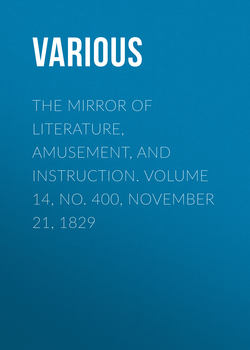Читать книгу The Mirror of Literature, Amusement, and Instruction. Volume 14, No. 400, November 21, 1829 - Various - Страница 2
Select Biography
ОглавлениеJUVENILE POETESS
MEMOIR OF LUCRETIA DAVIDSON,
Who died at Plattsburgh, N.Y., August 27, 1825, aged sixteen years and eleven months
[We hardly know how to give our readers an idea of the intense interest which this biographical sketch has excited in our mind; but we are persuaded they will thank us for adopting it in our columns. The details are somewhat abridged from No. LXXXII. of the Quarterly Review, (just published), where they appear in the first article, headed "Amir Khan, and other Poems: the remains of Lucretia Maria Davidson," &c., published at New York, in the present year. Prefixed to these "remains" is a biographical sketch, which forms the basis of the present memoir, and from the Poems are selected the few specimens with which it is illustrated.—ED.]
Lucretia Maria Davidson was born September 27, 1808, at Plattsburgh, on Lake Champlain. She was the second daughter of Dr. Oliver Davidson, and Magaret his wife. Her parents were in straitened circumstances, and it was necessary, from an early age, that much of her time should be devoted to domestic employments: for these she had no inclination, but she performed them with that alacrity which always accompanies good will; and, when her work was done, retired to enjoy those intellectual and imaginative, pursuits in which her whole heart was engaged. This predilection for studious retirement she is said to have manifested at the early age of four years. Reports, and even recollections of this kind, are to be received, the one with some distrust, the other with some allowance; but when that allowance is made, the genius of this child still appears to have been as precocious as it was extraordinary. Instead of playing with her schoolmates, she generally got to some secluded place, with her little books, and with pen, ink, and paper; and the consumption which she made of paper was such as to excite the curiosity of her parents, from whom she kept secret the use to which she applied it. If any one came upon her retirement, she would conceal or hastily destroy what she was employed upon; and, instead of satisfying the inquiries of her father and mother, replied to them only by tears. The mother, at length, when searching for something in a dark and unfrequented closet, found a considerable number of little books, made of this writing-paper, and filled with rude drawings, and with strange and apparently illegible characters, which, however, were at once seen to be the child's work. Upon closer inspection, the characters were found to consist of the printed alphabet; some of the letters being formed backwards, some sideways, and there being no spaces between the words. These writings were deciphered, not without much difficulty; and it then appeared that they consisted of regular verses, generally in explanation of a rude drawing, sketched on the opposite page. When she found that her treasures had been discovered, she was greatly distressed, and could not be pacified till they were restored; and as soon as they were in her possession, she took the first opportunity of secretly burning them.
These books having thus been destroyed, the earliest remaining specimen of her verse is an epitaph, composed in her ninth year, upon an unfledged robin, killed in the attempt at rearing it. When she was eleven years of age, her father took her to see the decorations of a room in which Washington's birthday was to be celebrated. Neither the novelty nor the gaiety of what she saw attracted her attention; she thought of Washington alone, whose life she had read, and for whom she entertained the proper feelings of an American; and as soon as she returned home, she took paper, sketched a funeral urn, and wrote under it a few stanzas, which were shown to her friends. Common as the talent of versifying is, any early manifestation of it will always be regarded as extraordinary by those who possess it not themselves; and these verses, though no otherwise remarkable, were deemed so surprising for a child of her age, that an aunt of hers could not believe they were original, and hinted that they might have been copied. The child wept at this suspicion, as if her heart would break; but as soon as she recovered from that fit of indignant grief, she indited a remonstrance to her aunt, in verse, which put an end to such incredulity.
We are told that, before she was twelve years of age, she had read most of the standard English poets—a vague term, excluding, no doubt, much that is of real worth, and including more that is worth little or nothing, and yet implying a wholesome course of reading for such a mind. Much history she had also read, both sacred and profane; "the whole of Shakspeare's, Kotzebue's, and Goldsmith's dramatic works;" (oddly consorted names!) "and many of the popular novels and romances of the day:" of the latter, she threw aside at once those which at first sight appeared worthless. This girl is said to have observed every thing: "frequently she has been known to watch the storm, and the retiring clouds, and the rainbow, and the setting sun, for hours."
